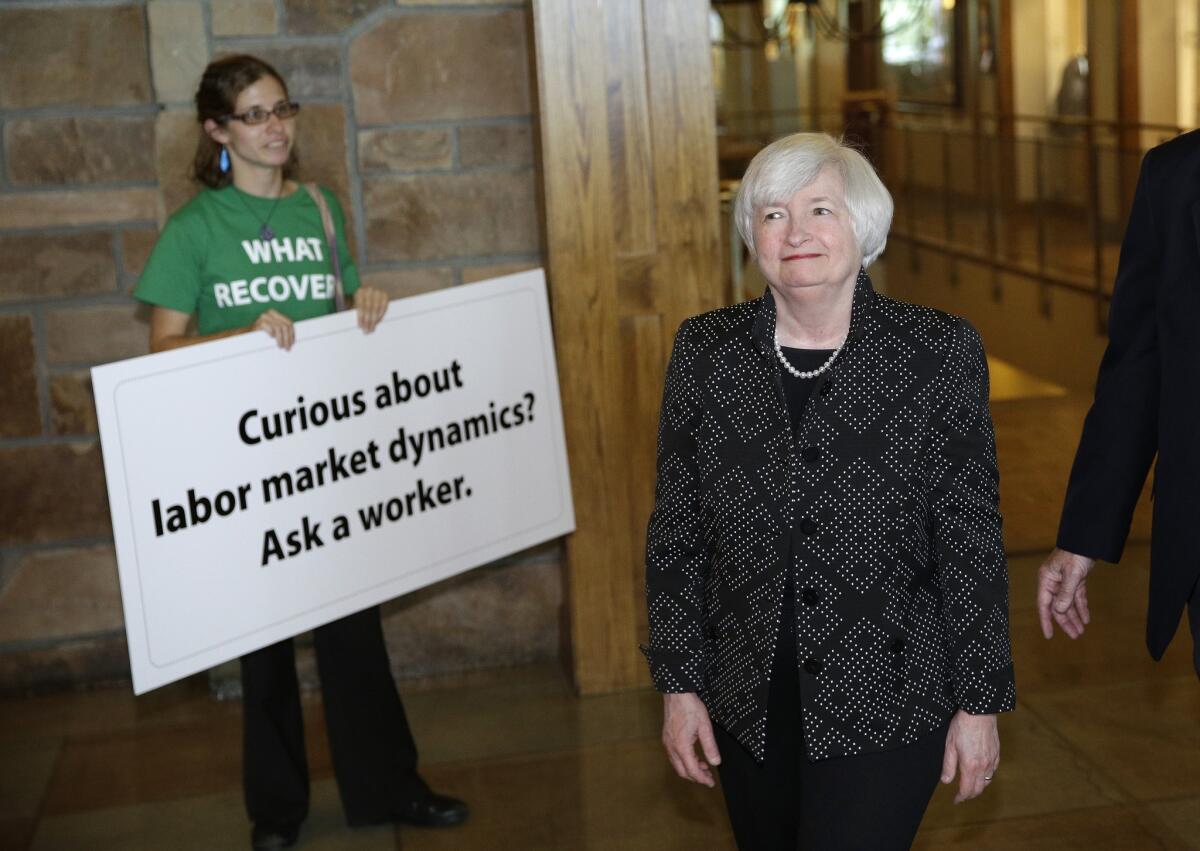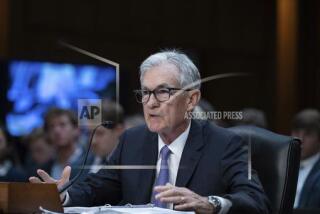Janet Yellen says no ‘simple recipe’ for Fed on interest rate hikes

- Share via
Reporting from Washington — Resisting pressure to more quickly tighten monetary policy, Federal Reserve Chairwoman Janet L. Yellen said Friday there was no “simple recipe” for central bank policymakers in deciding when the labor market had improved enough to handle a rise in interest rates.
Yellen said in an eagerly anticipated speech at a Fed conference in Jackson Hole, Wyo., that economic conditions were improving but the Great Recession was so damaging that it has made assessing the jobs situation “especially challenging.”
“In the five years since the end of the Great Recession, the economy has made considerable progress in recovering from the largest and most sustained loss of employment in the United States since the Great Depression,” she said, noting that July’s 6.2% unemployment rate was down nearly four percentage points since 2009.
“These developments are encouraging, but it speaks to the depth of the damage that, five years after the end of the recession, the labor market has yet to fully recover,” Yellen said.
As the unemployment rate has dropped, some Fed policymakers have pushed for the central bank to more quickly to pull back on its unprecedented stimulus efforts to avoid triggering high inflation.
Yellen reiterated that the Fed was on schedule to end its bond-buying stimulus policy in October. The program, known as quantitative easing, has helped the central bank’s balance sheet more than quadruple to $4.4 trillion since 2008.
As that effort ends, pressure is building from so-called inflation hawks for the Fed to start raising its benchmark short-term interest rate. The rate has been near zero since late 2008.
Charles Plosser, president of the Federal Reserve Bank of Philadelphia, told CNBC on Thursday the policymaking Federal Open Market Committee was taking a risk in its view that it would hold short-term interest rates low for “a considerable time” after ending the bond-buying program.
Minutes from the Fed’s most recent policymaking meeting in July showed “some” participants were “increasingly uncomfortable with the committee’s forward guidance” on interest rates.
Plosser, who was the only Open Market Committee member to dissent from the July policy statement, warned Thursday that failure to start raising interest rates soon could force the central bank to raise them more quickly later, which could be traumatic for the economy.
On Friday, Yellen, who is known as a dove on inflation, cautioned against the Fed moving too quickly to raise interest rates.
She expressed continued concern about the jobs situation and said that the sharp drop in the unemployment rate over the last year “somewhat overstates the improvement in overall labor market conditions.”
Yellen cited as negative factors the “sluggish pace” of wage growth, the large number of people who can only find part-time jobs and the historically low level of the working-age population that is employed.
“There is no simple recipe for appropriate policy in this context,” Yellen said.
Fed policymakers “will be closely monitoring incoming information on the labor market and inflation in determining the appropriate stance of monetary policy,” she said.
If the labor market improves more quickly than expected, or if inflation picks up, then interest rate hikes could “come sooner” and be “more rapid” than the Fed has signaled, she said.
But if “economic progress turns out to be disappointing,” interest rates could stay low even longer than forecast, Yellen said.
For breaking economic news, follow @JimPuzzanghera on Twitter
More to Read
Inside the business of entertainment
The Wide Shot brings you news, analysis and insights on everything from streaming wars to production — and what it all means for the future.
You may occasionally receive promotional content from the Los Angeles Times.











